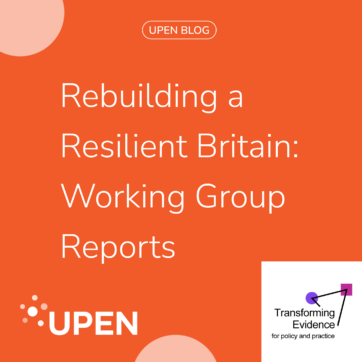At our recent members meeting on 10 June we engaged, via Padlet and discussion, in some informal consultation on UPEN’s future direction. This was structured in line with the stated aims of our recent Research England award; to enhance connections between academic research and public policymaking, to elevate academic-policy engagement capacity and capability, and to catalyse innovation and deliver system change. It was evident throughout that members value UPEN and what it can offer, albeit this is sometimes expressed in quite general terms. What remains uncertain, and luckily something we have been thinking about extensively, is how we can generate consistent value for our members, whilst simultaneously rethinking and reshaping what being a member of UPEN means.
We asked members about their perceived contribution and engagement with UPEN, and how they saw their role in our future development. For newer members it was clear that engagement was still developing, with a continuum evident between learning and more active participation, alongside a plea for UPEN to continue supporting underrepresented groups and institutions (e.g. small or specialist research institutes). For many members involvement was project-based or issue-specific and was dependent on current needs and available opportunities. Nevertheless, it was clear that engagement with UPEN was valued as something that would lead to tangible outcomes for both individuals and their institutions, with members expressing a desire to increase their involvement and co-produce new avenues for contribution. Likewise, there is significant interest in supporting UPEN’s strategic goals, and a desire to make a difference – using UPEN as a platform to shift thinking, and influence policy – with some expressing an interest in taking on leadership roles within UPEN’s structure. Taken together, responses can be grouped as follows:
- Support for shared purpose, collaboration, and collective mission
There is a strong sense of belonging to a community that is working across a common mission and towards collective goals, particularly in terms of a consistent motivation to shift perceptions around the value of research in policymaking, including in hitherto niche areas such as the arts and humanities. UPEN’s collaborative culture, collective intelligence, and opportunities for informal networking were particularly valued, and we will remain attentive to these as we evolve.
- A safe and inclusive space, where different voices can be heard
Our members characterised UPEN as a community of like-minded individuals, capable of offering moral support and validation, and contributing to a wider sense of belonging. Common experiences, interests, and professional backgrounds helped build a tangible sense of community, particularly within our subcommittee structure. More explicitly, the network’s role in championing knowledge mobilisers in niche roles was valued, as well as support for different types of institutional policy engagement ‘entity’ in a manner that did not feel hierarchical or exclusionary.
- Professional Development and Recognition
UPEN was seen as a respected network that supports professional growth, and a space where career development could take place; with the credibility of the network permitting members to demonstrate its value to their home institutions. This was assisted by proximity to connectors, who can link people, institutions, and ideas across the network and beyond. A key to this was the belief that active participation can reinforce communal bonds alongside a sense of being a part of something meaningful.
- Reciprocal opportunities to contribute and learn
Our members valued being in a reciprocal environment, where help was both offered and received. Consequently, there was a clear desire to give back, share expertise, and support others in the UPEN community. This also had a practical side, as there was a clear understanding that you get out what you put in, and a recognition that sharing best practice, insight, resources and experience would help members avoid reinventing the wheel, particularly when they were tasked with building and delivering institutional processes and schemes. A selection of tangible benefits, focused mainly around brokering relationships and influencing policy, were also mentioned.
- Informality and rewarding interaction
We should not lose track of the fact that UPEN’s convening power is predicated upon bringing people together to discuss activities that they genuinely enjoy! As one member summarised, there is value in “feeling a sense of kinship with peers”; colleagues who understand your work along with the challenges and occasionally thrills that it brings. Members clearly valued the social aspects of UPEN’s offer, and this added to a wider sense of connection across UPEN’s many communities. We will ensure that this spirit is not lost as we formulate our new programmes and events calendar.
In the coming months we will launch our new membership strategy, alongside a commitment to get ‘out and about’, meeting members where they are – both physically and organisationally – and learning more about the ways that UPEN can support universities, build collaborative policy engagement infrastructure within the regions and nations of the United Kingdom, and bring academic expertise and evidence into the policymaking process in new and innovative ways. If you want to discuss our membership engagement plans or find out more about any of UPEN’s forthcoming programme activities, we’d love to hear from you.
Please contact us at: hello@upen.ac.uk.


